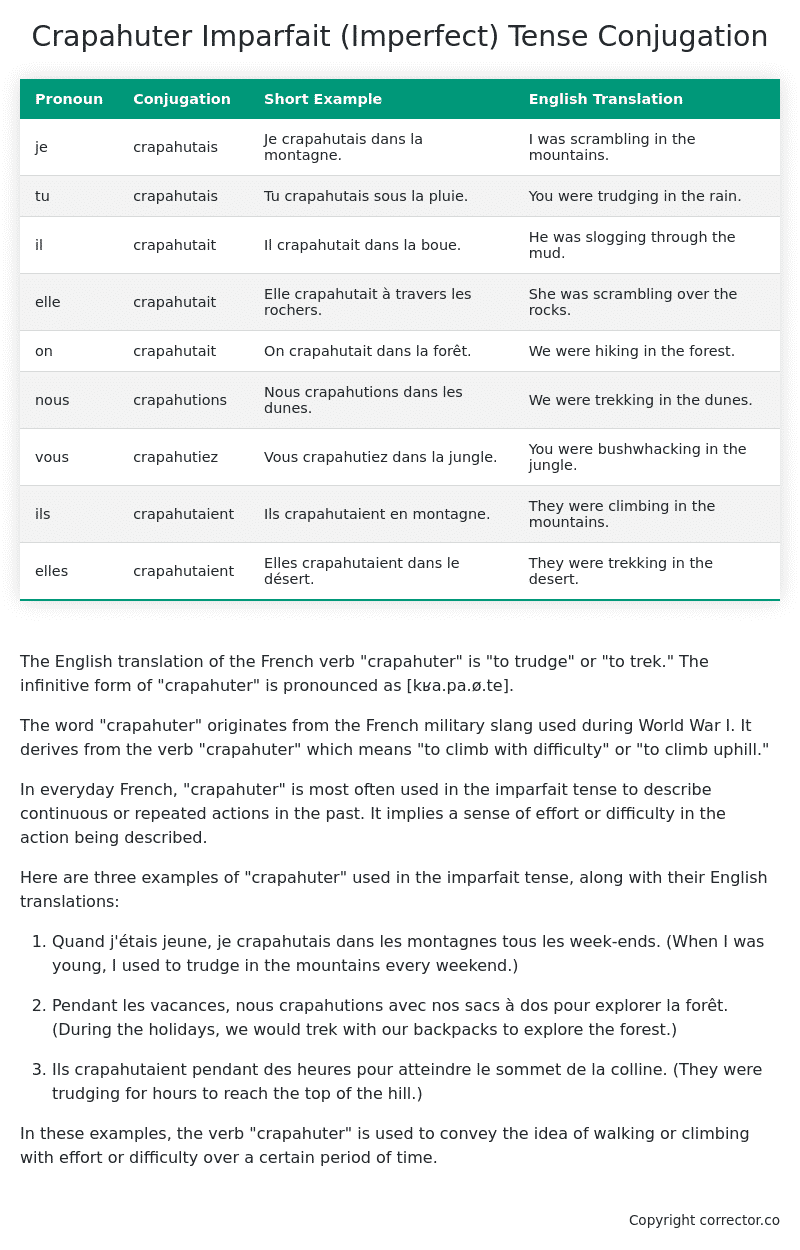Imparfait (Imperfect) Tense Conjugation of the French Verb crapahuter
Introduction to the verb crapahuter
The English translation of the French verb “crapahuter” is “to trudge” or “to trek.” The infinitive form of “crapahuter” is pronounced as [kʁa.pa.ø.te].
The word “crapahuter” originates from the French military slang used during World War I. It derives from the verb “crapahuter” which means “to climb with difficulty” or “to climb uphill.”
In everyday French, “crapahuter” is most often used in the imparfait tense to describe continuous or repeated actions in the past. It implies a sense of effort or difficulty in the action being described.
Here are three examples of “crapahuter” used in the imparfait tense, along with their English translations:
-
Quand j’étais jeune, je crapahutais dans les montagnes tous les week-ends.
(When I was young, I used to trudge in the mountains every weekend.) -
Pendant les vacances, nous crapahutions avec nos sacs à dos pour explorer la forêt.
(During the holidays, we would trek with our backpacks to explore the forest.) -
Ils crapahutaient pendant des heures pour atteindre le sommet de la colline.
(They were trudging for hours to reach the top of the hill.)
In these examples, the verb “crapahuter” is used to convey the idea of walking or climbing with effort or difficulty over a certain period of time.
Table of the Imparfait (Imperfect) Tense Conjugation of crapahuter
| Pronoun | Conjugation | Short Example | English Translation |
|---|---|---|---|
| je | crapahutais | Je crapahutais dans la montagne. | I was scrambling in the mountains. |
| tu | crapahutais | Tu crapahutais sous la pluie. | You were trudging in the rain. |
| il | crapahutait | Il crapahutait dans la boue. | He was slogging through the mud. |
| elle | crapahutait | Elle crapahutait à travers les rochers. | She was scrambling over the rocks. |
| on | crapahutait | On crapahutait dans la forêt. | We were hiking in the forest. |
| nous | crapahutions | Nous crapahutions dans les dunes. | We were trekking in the dunes. |
| vous | crapahutiez | Vous crapahutiez dans la jungle. | You were bushwhacking in the jungle. |
| ils | crapahutaient | Ils crapahutaient en montagne. | They were climbing in the mountains. |
| elles | crapahutaient | Elles crapahutaient dans le désert. | They were trekking in the desert. |
Other Conjugations for Crapahuter.
Le Present (Present Tense) Conjugation of the French Verb crapahuter
Imparfait (Imperfect) Tense Conjugation of the French Verb crapahuter (You’re reading it right now!)
Passé Simple (Simple Past) Tense Conjugation of the French Verb crapahuter
Passé Composé (Present Perfect) Tense Conjugation of the French Verb crapahuter
Futur Simple (Simple Future) Tense Conjugation of the French Verb crapahuter
Futur Proche (Near Future) Tense Conjugation of the French Verb crapahuter
Plus-que-parfait (Pluperfect) Tense Conjugation of the French Verb crapahuter
Passé Antérieur (Past Anterior) Tense Conjugation of the French Verb crapahuter
Futur Antérieur (Future Anterior) Tense Conjugation of the French Verb crapahuter
Subjonctif Présent (Subjunctive Present) Tense Conjugation of the French Verb crapahuter
Subjonctif Passé (Subjunctive Past) Tense Conjugation of the French Verb crapahuter
Subjonctif Imparfait (Subjunctive Imperfect) Tense Conjugation of the French Verb crapahuter
Subjonctif Plus-que-parfait (Subjunctive Pluperfect) Tense Conjugation of the French Verb crapahuter
Conditionnel Présent (Conditional Present) Tense Conjugation of the French Verb crapahuter
Conditionnel Passé (Conditional Past) Tense Conjugation of the French Verb crapahuter
Conditionnel Passé II (Conditional Past II) Tense Conjugation of the French Verb crapahuter
L’impératif Présent (Imperative Present) Tense Conjugation of the French Verb crapahuter
L’impératif Passé (Imperative Past) Tense Conjugation of the French Verb crapahuter
L’infinitif Présent (Infinitive Present) Tense Conjugation of the French Verb crapahuter
L’infinitif Passé (Infinitive Past) Tense Conjugation of the French Verb crapahuter
Le Participe Présent (Present Participle) Tense Conjugation of the French Verb crapahuter
Le Participe Passé (Past Participle) Tense Conjugation of the French Verb crapahuter
Struggling with French verbs or the language in general? Why not use our free French Grammar Checker – no registration required!
Get a FREE Download Study Sheet of this Conjugation 🔥
Simply right click the image below, click “save image” and get your free reference for the crapahuter imparfait tense conjugation!

Crapahuter – About the French Imparfait Tense
NOTE: To take a deep dive into all the French tenses then see our article on Mastering French Tense Conjugation.
Formation of the Imparfait Tense
For regular -er verbs:
For regular -ir verbs
For regular -re verbs
Common Everyday Usage Patterns
Description of Past Habits
Background Information
Mental and Emotional States
It’s employed to express emotions, thoughts, or physical sensations in the past. For example: “J’étais content quand il est arrivé.” (I was happy when he arrived.)
Ongoing Actions
Points to Note About the Imparfait Tense
Passé Composé vs. Imparfait
Conditional
Si Clauses
Narration
I hope you enjoyed this article on the verb crapahuter. Still in a learning mood? Check out another TOTALLY random French verb imparfait conjugation!


